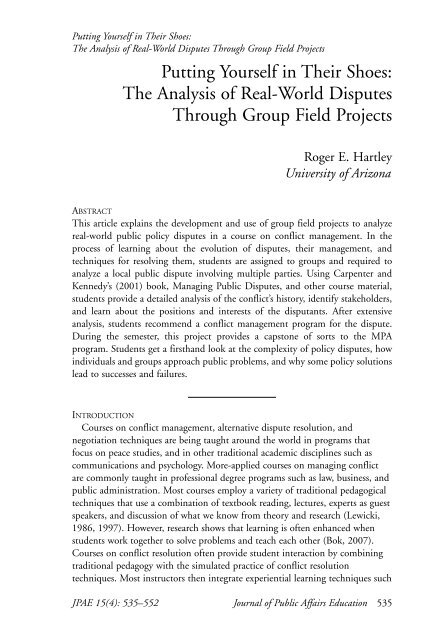JOURNAL OF PUBLIC AFFAIRS EDUCATION - National ...
JOURNAL OF PUBLIC AFFAIRS EDUCATION - National ...
JOURNAL OF PUBLIC AFFAIRS EDUCATION - National ...
You also want an ePaper? Increase the reach of your titles
YUMPU automatically turns print PDFs into web optimized ePapers that Google loves.
Putting Yourself in Their Shoes:<br />
The Analysis of Real-World Disputes Through Group Field Projects<br />
Putting Yourself in Their Shoes:<br />
The Analysis of Real-World Disputes<br />
Through Group Field Projects<br />
Roger E. Hartley<br />
University of Arizona<br />
ABSTRACT<br />
This article explains the development and use of group field projects to analyze<br />
real-world public policy disputes in a course on conflict management. In the<br />
process of learning about the evolution of disputes, their management, and<br />
techniques for resolving them, students are assigned to groups and required to<br />
analyze a local public dispute involving multiple parties. Using Carpenter and<br />
Kennedy’s (2001) book, Managing Public Disputes, and other course material,<br />
students provide a detailed analysis of the conflict’s history, identify stakeholders,<br />
and learn about the positions and interests of the disputants. After extensive<br />
analysis, students recommend a conflict management program for the dispute.<br />
During the semester, this project provides a capstone of sorts to the MPA<br />
program. Students get a firsthand look at the complexity of policy disputes, how<br />
individuals and groups approach public problems, and why some policy solutions<br />
lead to successes and failures.<br />
INTRODUCTION<br />
Courses on conflict management, alternative dispute resolution, and<br />
negotiation techniques are being taught around the world in programs that<br />
focus on peace studies, and in other traditional academic disciplines such as<br />
communications and psychology. More-applied courses on managing conflict<br />
are commonly taught in professional degree programs such as law, business, and<br />
public administration. Most courses employ a variety of traditional pedagogical<br />
techniques that use a combination of textbook reading, lectures, experts as guest<br />
speakers, and discussion of what we know from theory and research (Lewicki,<br />
1986, 1997). However, research shows that learning is often enhanced when<br />
students work together to solve problems and teach each other (Bok, 2007).<br />
Courses on conflict resolution often provide student interaction by combining<br />
traditional pedagogy with the simulated practice of conflict resolution<br />
techniques. Most instructors then integrate experiential learning techniques such<br />
JPAE 15(4): 535–552 Journal of Public Affairs Education 535

















